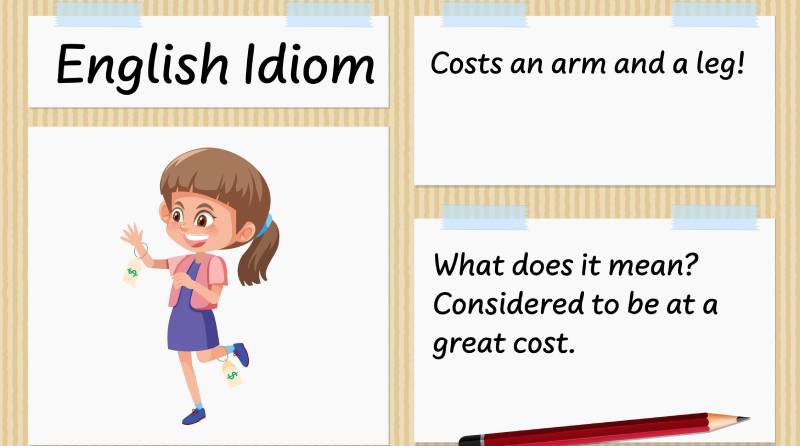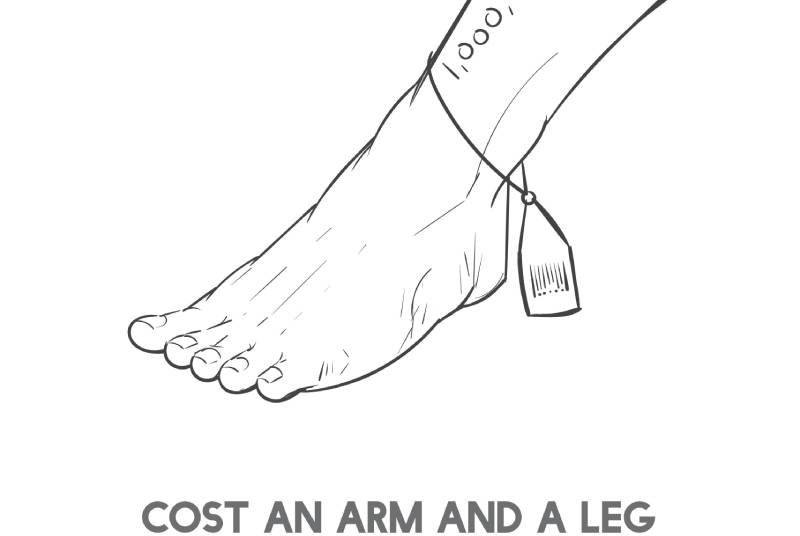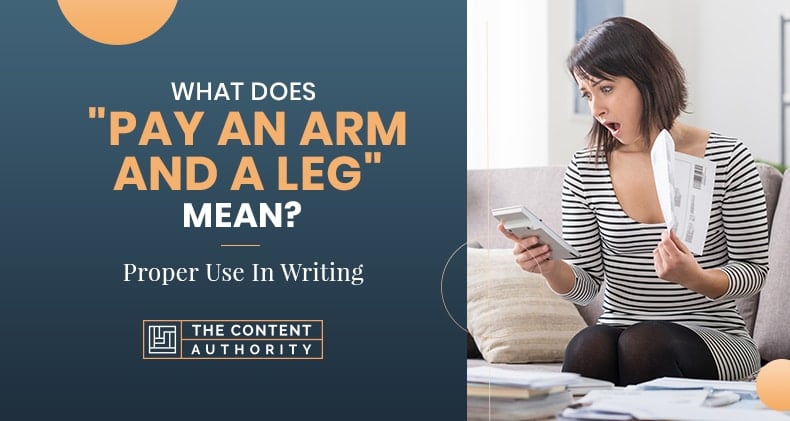“Pay An Arm And A Leg” is one of those idioms used in informal conversations; it paints a picture or comparison of what is literally implied by the phrase. When “paying an arm and a leg” for something, it is considered to be overpriced, and in turn, you may be reluctant to pay it.
We can use the phrase “Pay an arm and a leg” to point out something is too expensive or at a high price. There are alternative forms to say it such as ‘costs an arm and a leg’ or ‘give an arm and a leg’ for example, “I had to give an arm and a leg to get the wire removed from my driveway”.
Something can cost an arm and a leg when it is considered to be massively expensive. To give up an arm or a leg is certainly a significant thing to let go of in exchange for something, let’s dive into more details about this phrase.
Origin Of Phrase

“Pay an arm and a leg” can be applied to a series of situations describing how expensive something can be, in an attempt to literally compare it to losing an arm and a leg.
There are many theories of where this phrase originally came from, this popular idiom is believed to have originated in America around World War II, it was apparently used in reference to all the soldiers coming back with amputated limbs, the news was brimming with reports on soldiers who had lost ‘an arm and a leg’ while fighting to make the world safe.
Prior to this period, there are records of two phrases from which the idiom may have been developed. The first one is, “I will give my right arm”, meaning that I would be ready to give up something as beloved as my arm in exchange for something I really want, the second one is, “If it takes a leg”, meaning that I would go to the lengths of giving up a leg in exchange for what I want. Both of these idioms were commonly used in the nineteenth century.
One of the first references after this is dated from 1949 in The Long Beach Independent. The quote is about cooking a low-cost Christmas meal:
“Food editor Beulah Karney has more than 10 ideas for the homemaker who wants to say “Merry Christmas” and not have it cost her an arm and a leg.”
Basically, the narrator is describing a person looking for recipes that aren’t going to cost an “arm and a leg”, in other words, a lot of money.
Some idioms are alike in the sense that they use body parts to represent a sacrifice for something one really desires to have. For example, this might be connected to the neology in the following phrase from Sharpe’s London Journal:
“He felt as if he could gladly give his right arm to be cut off if it would make him, at once, old enough to go and earn money instead of Lizzy.”
Both of these expressions were published in 1849, however, there are other earlier references to this kind of overplay with words. Subsequently, another example reads:
“A man who owes five years subscription to the Gazette is trying to stop his paper without paying up, and the editor is going to grab that back pay if it takes a leg.”
Despite the fact that these last two quotes don’t use the phrase as is – “an arm and a leg”, it is not difficult to see how they are related and how the phrase could have evolved from there. You can also find versions of “pay an arm and a leg” in other languages, such as:
- French: “Payer un bras et une jambe”
- German: “Zahle einen arm und ein bein”
- Spanish: “Pagar un brazo y una pierna”
Some people think the phrase may have also originated from the legend of Edward Elric. He was an alchemist who tried to bring his deceased mother back to life and later restored his brother’s soul at the high cost of his leg and arm.
Intriguingly, another explanation surged around “an arm and a leg.” This one believes that the phrase originated in painting commissions where artists are reported to have been charging more money for portraits that displayed body parts and depending on the size of the portrait. For instance, a head and shoulder painting would cost the least amount of money. One that included the waist and the arms had the middle price, and a full-length portrait that included the legs was the most expensive, there is, however, no proof of this speculation.
How People Use The Phrase
People say something “costs an arm and a leg” to describe when something is way too expensive and overpriced. Cost, charge, pay, and give are almost always used with the phrase, such as in the example, “Car rentals around here cost an arm and a leg.”
Like many idioms, “cost an arm and a leg”, can be used in casual everyday conversation with friends, family and close colleagues. This is a regular well-known phrase, used by many English speakers. Most people will understand its meaning right away when read or heard.
It is a phrase anyone can relate to at some point, therefore, when used properly, it is a good way to express your point of view of how much something costs. This phrase is less common in formal or professional settings, like a very important meeting or an academic essay; its friendly nature may feel inappropriate in such a setting.

Examples Of The Phrase In A Sentence
- Watch out, you will have to pay an arm and a leg for a simple coffee at that restaurant.
- I don’t want to have to pay an arm and a leg to fix the ring, I’d rather just buy a new one.
- Fuel is so expensive these days. It costs an arm and a leg to fill up my car.
- Never order water in a restaurant; it costs an arm and a leg.
- No, the price is too high – he wants an arm and a leg for that old bike.
- I had to pay an arm and a leg, but the truck is running again.
- It costs me an arm and a leg to enroll in the Business Strategy course for next Summer.
- Ugh! This thing costs an arm and a leg! I don’t have all that money.
- Did you see what Henry bought the other day? He paid an arm and a leg for that.
- I don’t know how you afforded that, it must’ve cost you an arm and a leg.
- You know this store, they always want you to pay an arm and a leg when you shop there.
- I had a flat tire on my way to work and the guy at the gas station charged me an arm and a leg to fix it.
- The phone companies these days are ridiculous. They expect an arm and a leg just so you can make simple phone calls.
- Even better, the company’s motors cost the same as standard motors, therefore, grocery chains aren’t paying an arm and a leg for the essential cooling tech.
- “The price of oats is pretty high”, he said. “And the veterinarian charges an arm and a leg”.
- It is a great way for parents to support the kids without it costing them an arm and a leg.
- If you want to go out on a Wednesday because you don’t feel like cooking, you cannot spend an arm and a leg and still find a nice place to dine out.
- “They’re charging an arm and a leg, promising the world, and the result is that people end up losing their homes”, says Isabel, who is a Mexican American.
- I’d like to have a new beach house, but it may cost me an arm and a leg.
- Their mother’s hospital bill cost an arm and a leg.
- He’s always paying an arm and a leg for the newest technology gadgets.
Why Do Writers Use “Cost An Arm And A Leg?”

Writers tend to use this phrase in the same way that everyday English speakers do. Since “cost an arm and a leg” is easily understood by many people, it can be inserted in conversations between characters in novels or stories. It is usual practice for writers to regularly use proverbs, idioms and other common phrases as a way of identifying with the reader to relate to phrases they themselves have used on an occasion, use regularly, or have perhaps heard somewhere.
Other English Idioms
Conclusion
Sometimes, it demands great sacrifice to get or achieve whatever it is that has this exuberant high cost, and it is okay to wonder if this sacrifice is truly worth it. Next time your friend tells you something cost him his arm and a leg, you know he obviously wasn’t talking about trading his body parts; he just meant that it was very expensive. An arm and a leg is quite a hefty amount to pay. Tell us, what made you want to look up “an arm and a leg”?
Shawn Manaher is the founder and CEO of The Content Authority. He’s one part content manager, one part writing ninja organizer, and two parts leader of top content creators. You don’t even want to know what he calls pancakes.

